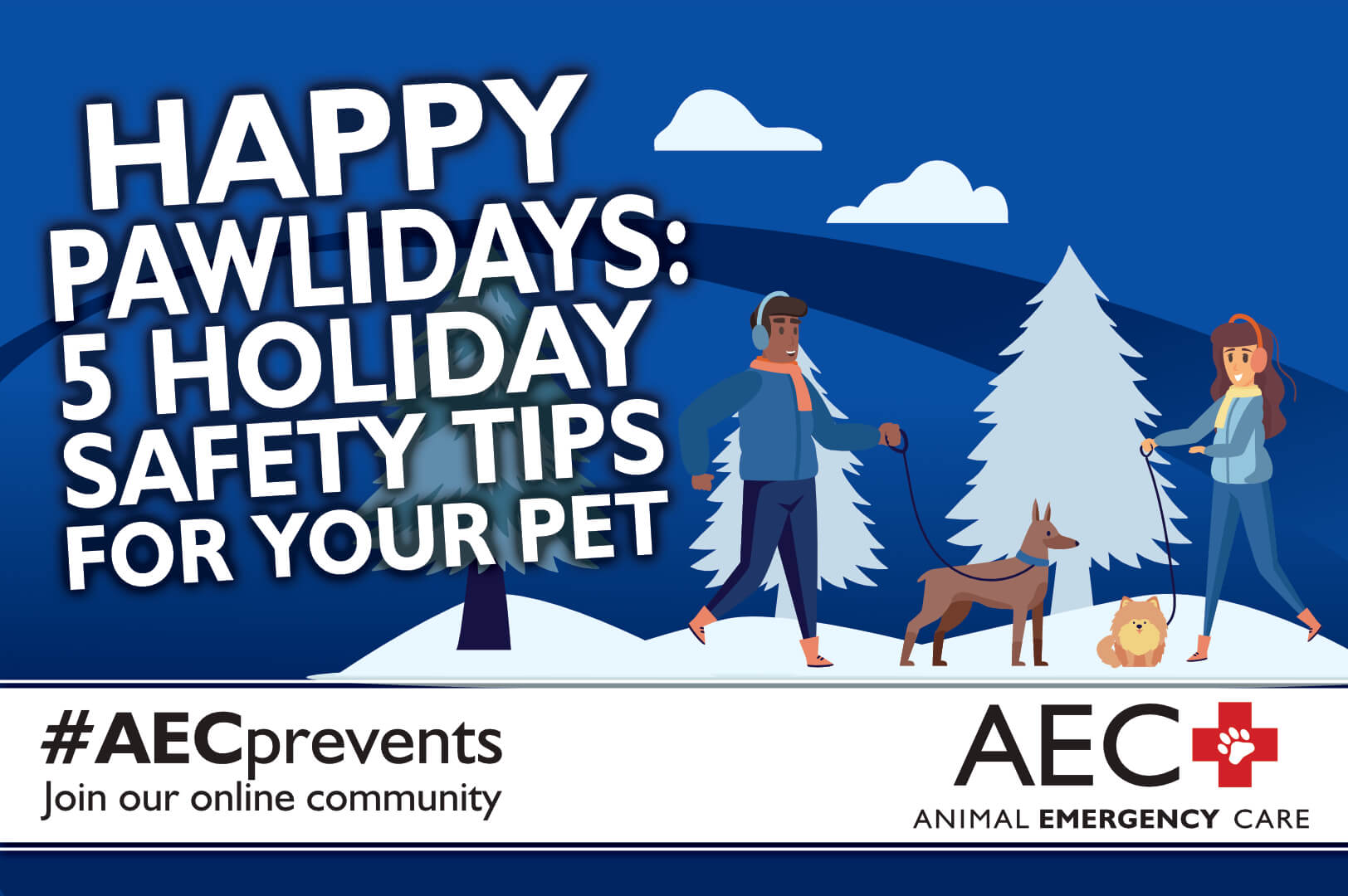The holiday season is a special time with friends and family including your four-legged companions. The dropping temperatures, twinkling lights, and crackling fires provide a festive atmosphere for cozy celebrations. Holiday festivities are extra special when shared with your pet but many traditions and meals can be dangerous for curious furry pals. Many holiday treats such as chocolate sweets and marinated meats are the culprit in unexpected trips to the emergency veterinarian. Avoid a pawliday disaster by following these five pet holiday safety tips from our Animal Emergency Care team.
#1: Use caution with holiday decor around pets
Festive decor, Christmas trees, dangling ornaments, and candles can transform your home into a magical but potentially dangerous winter wonderland. Take precautions when adorning your home with the following:
- Christmas trees — Many pets will want to investigate the new smells and tree branches so ensure they can’t tip the tree over and possibly injure themselves by securing it to a ceiling or doorway with fishing line. In addition, never use water additives in the tree stand. Pets can mistake tree water for their personal water dish, and drinking additive-laden water can lead to vomiting, diarrhea, and dehydration.
- Ornaments — Place all fragile ornaments such as glass balls and food-based decorations high on the tree to prevent mischievous pets from injuring their paws on broken ornaments or ingesting dangerous ingredients.
- Tinsel —Tinsel and ribbon are common culprits in many feline holiday emergencies, leading to intestinal blockages that often require surgical removal. Ensure you place all tinsel and decorative ribbons out of paw’s reach.
- Candles and potpourri — Place lighted candles far out of reach of swatting paws or wagging tails to prevent burned fur or house fires. Avoid using scented candles or potpourri that contains essential oils because they can be toxic to pets, especially the oils described here.
#2: Keep pets out of the kitchen and away from the dinner table
Many holiday celebrations revolve around large savory meals and endless sweet treats. The kitchen is a popular gathering place during family festivities and the delicious aromas are difficult for pets—and most humans—to resist. However, kitchen chaos can lead to counter-surfing and dumpster-diving pets eager to sample the day’s bounty. Many holiday ingredients and dishes are toxic or difficult for pets to digest. Sharing your plate with your pet can lead to gastrointestinal (GI) distress and inflammation including pancreatitis which is a potentially deadly inflammatory condition that can cause vomiting, diarrhea, lethargy, and dehydration. Additionally, never share leftover bones with your pet as they can cause dangerous GI blockages which may require emergency surgery. Also ensure you put a pet-proof lid on all garbage cans within your pet’s reach and frequently remove all garbage and food scraps from the home.
#3: Avoid pet-toxic holiday plants and flowers
Floral centerpieces and seasonal plants are popular holiday gifts; however, ensure you do not bring any pet-toxic plants into your home. Many plants and especially lilies are severely toxic to cats. Eating only a small amount of any part of the plant, including the pollen and leaves, can cause drooling, vomiting, and decreased appetite, and can lead to kidney failure. While the popular poinsettia is no longer considered toxic unless large amounts are consumed, the sap in poinsettia leaves is irritating to your pet’s mouth and throat and eating the leaves likely will cause your pet to become nauseated and vomit. Always check the ASPCA toxic plant list before adorning your table or home with floral or plant centerpieces, and keep these other popular holiday plants out of pet’s reach:
- Mistletoe
- Balsam
- Amaryllis
- Pine
- Cedar
- Holly
- Christmas cactus
#4: Keep wires, batteries, and small toys out of paw’s reach
The numerous cords and wires required for your twinkling lights, electric candles, and other holiday decorations can be dangerous to curious pets who may mistake them for new chew toys. Keep all cords and wires out of paw’s reach because chewing or swallowing them can lead to serious injury including oral burns, electric shock, or GI distress or blockages.
Ensure your pet does not have access to any batteries because most contain zinc which is toxic if ingested. It also can cause GI distress, anemia, seizures, and death in some cases. Keep a watchful eye as well on any small children’s toys since your pet could mistake them for new pet toys and swallow them which could cause intestinal damage or a blockage that requires surgical removal.
#5: Prepare for unexpected pet emergencies
It is not uncommon for Christmas cats and “Holidogs” to let their mischievous nature get the better of them despite your best efforts to keep them out of holiday trouble. Ensure you have the ASPCA Animal Poison Control Center number, your family veterinarian’s contact information, and our Animal Emergency Care number and address easily accessible in the event of an accidental toxin ingestion or injury. Common pet holiday emergencies may require an extended hospital stay which can result in a larger veterinary bill. Consider purchasing a pet health insurance plan like Trupanion to ensure funds are available to cover emergency treatment costs. Trupanion can pay your veterinary clinic directly which eliminates the need to submit paperwork and wait for your reimbursement. Other pet emergency payment options include pet health savings accounts, Care Credit, Scratch Pay, and short-term loans.
Call your family veterinarian right away if your pet gets into any holiday trouble. If you need help after hours, Animal Emergency Care is open 24 hours a day. #AECprevents
Sources:
https://www.avma.org/resources-tools/pet-owners/petcare/holiday-pet-safety
https://www.petmd.com/dog/seasonal/evr_multi_dangerous_winter_holiday_plants
https://www.aspca.org/pet-care/general-pet-care/holiday-safety-tips
https://www.merckvetmanual.com/toxicology/zinc-toxicosis/overview-of-zinc-toxicosis


